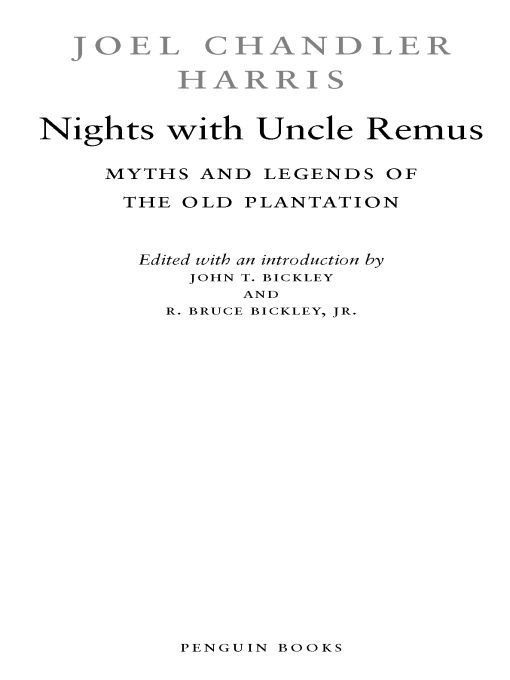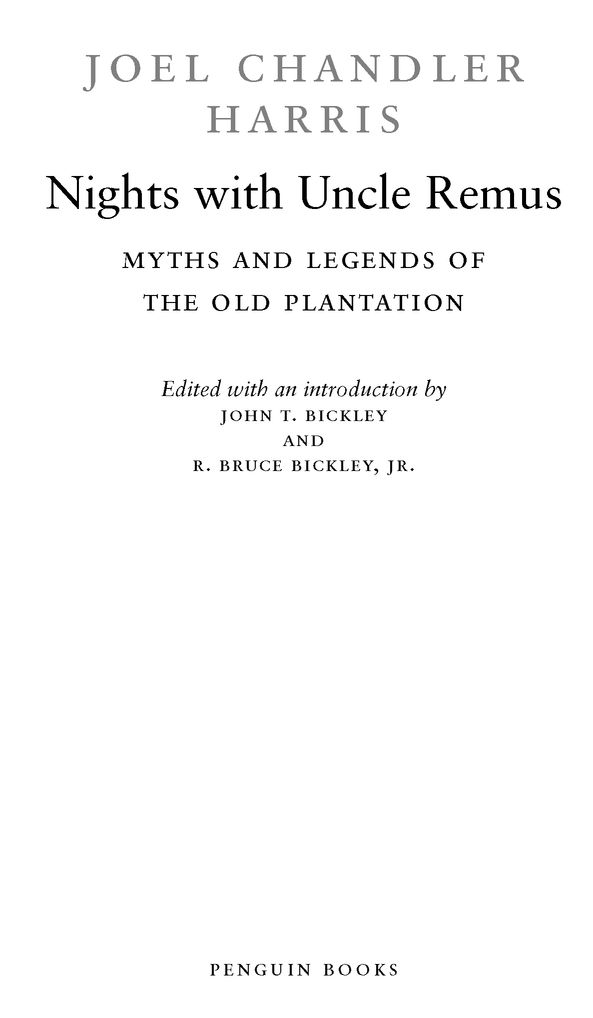Nights with Uncle Remus
Read Nights with Uncle Remus Online
Authors: Joel Chandler Harris


Table of Contents
Â
Â

NIGHTS WITH UNCLE REMUS
JOEL CHANDLER HARRIS was born in Eatonton, Georgia, in 1845. Setting type and learning to write under Joseph Addison Turner's mentoring at nearby Turnwold Plantation, Harris later worked for newspapers in Macon and Forsyth. He served as Associate Editor for the
Savannah Morning News
(1870-1876) and for the
Atlanta Constitution
(1876-1900). Harris earned reputations as a literary comedian, a talented and resourceful amateur folklorist, a local-color fiction writer, a children's author, and a major New South journalist. He wrote 185 Uncle Remus tales, seven volumes of short fiction, four novels and six collections of children's stories. Harris's portraits of poor whites and his socio-logically and rhetorically complex Brer Rabbit trickster stories have influenced generations of writers, from Mark Twain to Zora Neale Hurston, William Faulkner, Ralph Ellison, Toni Morrison, and Julius Lester. Harris's creation of highly animated, believably anthropomorphic animal characters also helped reinvent the modern children's story, from Rudyard Kipling's jungle tales to Beatrix Potter's Peter Rabbit stories. Brer Rabbit and the Tar Baby have also become popular culture icons. Harris died in 1908.
Savannah Morning News
(1870-1876) and for the
Atlanta Constitution
(1876-1900). Harris earned reputations as a literary comedian, a talented and resourceful amateur folklorist, a local-color fiction writer, a children's author, and a major New South journalist. He wrote 185 Uncle Remus tales, seven volumes of short fiction, four novels and six collections of children's stories. Harris's portraits of poor whites and his socio-logically and rhetorically complex Brer Rabbit trickster stories have influenced generations of writers, from Mark Twain to Zora Neale Hurston, William Faulkner, Ralph Ellison, Toni Morrison, and Julius Lester. Harris's creation of highly animated, believably anthropomorphic animal characters also helped reinvent the modern children's story, from Rudyard Kipling's jungle tales to Beatrix Potter's Peter Rabbit stories. Brer Rabbit and the Tar Baby have also become popular culture icons. Harris died in 1908.
Â
JOHN T. BICKLEY earned his B.A. in Literature from Florida State University and his M.A. in English from the University of North Carolina at Chapel Hill. He is currently working as a fiction editor and completing his Ph.D. in Medieval English Literature, with a minor in Film, at Florida State. He has published fiction as well as articles on film, the humanities, and Native American anthropology.
Â
R. BRUCE BICKLEY, JR., Griffith T. Pugh Professor of English at Florida State University, received his B.A. in English from the University of Virginia and his M.A. and Ph.D. in English from Duke University. He has published
The Method of Melville's Short Fiction
and six books on Joel Chandler Harris.
The Method of Melville's Short Fiction
and six books on Joel Chandler Harris.

PENGUIN BOOKS
Penguin Group (USA) Inc., 375 Hudson Street, New York, New York 10014, U.S.A.
Penguin Books Ltd, 80 Strand, London WC2R 0RL, England
Penguin Books Australia Ltd, 250 Camberwell Road, Camberwell, Victoria 3124, Australia
Penguin Books Canada Ltd, 10 Alcorn Avenue, Toronto, Ontario, Canada M4V 3B2
Penguin Books India (P) Ltd, 11 Community Centre, Panchsheel Park, New Delhi - 110 017, India
Penguin Books (N.Z.) Ltd, Cnr Rosedale and Airborne Roads, Albany, Auckland, New Zealand
Penguin Books (South Africa) (Pty) Ltd, 24 Sturdee Avenue, Rosebank, Johannesburg 2196, South Africa
Â
Published by the Penguin GroupPenguin Group (USA) Inc., 375 Hudson Street, New York, New York 10014, U.S.A.
Penguin Books Ltd, 80 Strand, London WC2R 0RL, England
Penguin Books Australia Ltd, 250 Camberwell Road, Camberwell, Victoria 3124, Australia
Penguin Books Canada Ltd, 10 Alcorn Avenue, Toronto, Ontario, Canada M4V 3B2
Penguin Books India (P) Ltd, 11 Community Centre, Panchsheel Park, New Delhi - 110 017, India
Penguin Books (N.Z.) Ltd, Cnr Rosedale and Airborne Roads, Albany, Auckland, New Zealand
Penguin Books (South Africa) (Pty) Ltd, 24 Sturdee Avenue, Rosebank, Johannesburg 2196, South Africa
Â
Penguin Books Ltd, Registered Offices:
80 Strand, London WC2R 0RL, England
80 Strand, London WC2R 0RL, England
Â
First published in the United States of America by James R. Osgood and Company 1883
This edition with an introduction by John T Bickley and R. Bruce Bickley, Jr.,
published in Penguin Books 2003
This edition with an introduction by John T Bickley and R. Bruce Bickley, Jr.,
published in Penguin Books 2003
Â
Â
Introduction copyright © John T. Bickley and R. Bruce Bickley, Jr., 2003All rights reserved
Â
LIBRARY OF CONGRESS CATALOGING-IN-PUBLICATION DATA
Â
Â
Harris, Joel Chandler, 1848-1908.
Nights with Uncle Remus / Joel Chandler Harris ; edited and with an introduction by
R. Bruce Bickley and John Bickley.
p. cm.â(Penguin classics)
Includes bibliographical references.
Nights with Uncle Remus / Joel Chandler Harris ; edited and with an introduction by
R. Bruce Bickley and John Bickley.
p. cm.â(Penguin classics)
Includes bibliographical references.
eISBN : 978-1-101-01040-2
1. Remus, Uncle (Fictitious character)âFiction. 2. GeorgiaâSocial life and
customsâFiction. 3. African American menâFiction. 4. Plantation lifeâFiction.
5. AnimalsâFiction. I. Bickley, R. Bruce, 1942- II. Bickley, John T. III. Title. IV. Series.
PS1806.A2B53 2003
813'.4âdc21 2003050438
customsâFiction. 3. African American menâFiction. 4. Plantation lifeâFiction.
5. AnimalsâFiction. I. Bickley, R. Bruce, 1942- II. Bickley, John T. III. Title. IV. Series.
PS1806.A2B53 2003
813'.4âdc21 2003050438
Â
Â
Â
The scanning, uploading, and distribution of this book via the Internet or via any other means
without the permission of the publisher is illegal and punishable by law. Please purchase only
authorized electronic editions and do not participate in or encourage electronic piracy
of copyrighted materials. Your support of the author's rights is appreciated.
without the permission of the publisher is illegal and punishable by law. Please purchase only
authorized electronic editions and do not participate in or encourage electronic piracy
of copyrighted materials. Your support of the author's rights is appreciated.
Introduction
Folklore Performance and the Legacy of Joel Chandler Harris
In the summer of 1882, still flush with the popular and critical success of
Uncle Remus: His Songs and His Sayings
(1880), Joel Chandler Harris was waiting to catch a train in Norcross, Georgia, twenty miles northeast of Atlanta. Harris explains in detail the unique experience he had that night, and he made sure to include this important episode in his introduction to his second book,
Nights with Uncle Remus: Myths and Legends of the Old Plantation
(1883). The train was late, and darkness had already fallen when Harris overheard several black railroad workers sitting in small groups on the platform and perched on crossties, cracking jokes at each other's expense and laughing boisterously. Harris sat down next to one of the liveliest talkers in the group, a middle-aged worker. After enjoying their banter for awhile, Harris heard someone in the crowd mention “Ole Molly Har'.” Suddenly inspired, and “in a low tone, as if to avoid attracting attention,” Harris narrated the tar-baby story to his companion, “by way of a feeler.”
Uncle Remus: His Songs and His Sayings
(1880), Joel Chandler Harris was waiting to catch a train in Norcross, Georgia, twenty miles northeast of Atlanta. Harris explains in detail the unique experience he had that night, and he made sure to include this important episode in his introduction to his second book,
Nights with Uncle Remus: Myths and Legends of the Old Plantation
(1883). The train was late, and darkness had already fallen when Harris overheard several black railroad workers sitting in small groups on the platform and perched on crossties, cracking jokes at each other's expense and laughing boisterously. Harris sat down next to one of the liveliest talkers in the group, a middle-aged worker. After enjoying their banter for awhile, Harris heard someone in the crowd mention “Ole Molly Har'.” Suddenly inspired, and “in a low tone, as if to avoid attracting attention,” Harris narrated the tar-baby story to his companion, “by way of a feeler.”
Harris reconstructs in some detail what occurred next, a folkloristic event any ethnologist today would swap the SUV for. The lively man next to Harris kept interrupting the tar-baby narration with loud and frequent commentsâ“Dar now!” and “He's a honey, mon!” and “Gentermens! git out de way, an' gin 'im room!” Suddenly, Harris's audience of one grows exponentially into a storytelling community of thirty.
These comments, and the peals of unrestrained and unrestrainable laughter that accompanied them, drew the attention of the other Negroes, and before the climax of the story had been reached, where Brother Rabbit is cruelly thrown into the brier-patch, they had all gathered around and made themselves comfortable. Without waiting to see what the effect of the âTar Baby' legend would be, the writer [Harris] told the story of âBrother Rabbit and the Mosquitoes,' and this had the effect of convulsing them. Two or three could hardly wait for the conclusion, so anxious were they to tell stories of their own. The result was that, for almost two hours, a crowd of thirty or more Negroes vied with each other to see which could tell the most and the best stories.
Â
Harris notes that some of the black workers told stories poorly, “giving only meager outlines,” while others “told them passing well.” And then he adds that “one or two, if their language and gestures could have been taken down, would have put Uncle Remus to shame.” Harris, always the astute observer, stresses that a storyteller's language and gestures must interact with the audience's emotions to create a truly memorable oral performance.
Other books
Honey to Soothe the Itch by Radcliffe, Kris Austen
Mama's Boy and Other Dark Tales by Fran Friel
Caravan of Thieves by David Rich
Falling for Autumn by Sherelle Green
Longarm 245: Longarm and the Vanishing Virgin by Evans, Tabor
Each Shining Hour by Jeff High
Badger the Mystical Mutt and Daydream Drivers by Lyn McNicol
Mary's Guardian by Carol Preston
The Father of Desiree`s Baby by Kate Chopin
Hospital Corridors by Mary Burchell.
